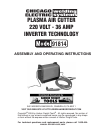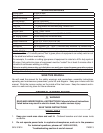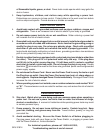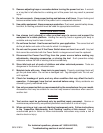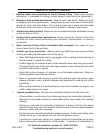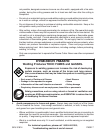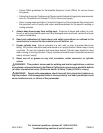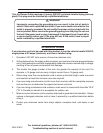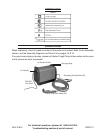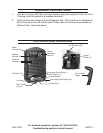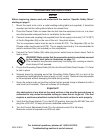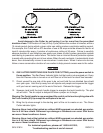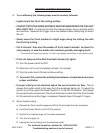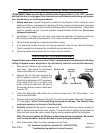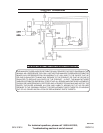
For technical questions, please call 1-800-444-3353;
Troubleshooting section at end of manual.
SKU 91814 PAGE 3
SPECIFICATIONS
Cutting Depth 3/8 inch on steel
Cutting Current 5 to 36 Amps listed
Rated Load Voltage 100 VDC
No-load Voltage 200 VDC (maximum)
Power Consumption 220 VAC, 15 Amps, 50/60 Hz, single phase
Line Cord 6’ - 9” long (without 220 VAC twist plug); 14 AWG x 3-C
Arc Torch Cable 16’ - 3” long
Ground Cable 9’ long, 1 AWG x 6 mm
2
Air Requirement 60-65 PSI, dry compressed air; 3.5 CFM @ 65 PSI
Arc Striking System Pilot arc feature with two second delay
Power Switch Rocker type, lighted
Overall Dimensions 16-3/4” (L) x 14-3/4” (H) x 8-1/8” (W)
Weight 26.5 lb.
Accessories Inlet air regulator (1/4” - 18 NPT), Shoulder strap, Electrode, Tip, Ceramic Ring
Rated Duty Cycle 40% at 36 amps, 60% at 28 amps
DUTY CYCLE is a welding or cutting, equipment specification, which defines the number of
minutes, within a 10-minute period, that a given piece of equipment can safely weld or cut
at its rated load without overheating.
For example, if a welder or cutting type piece of equipment is rated at a 40% duty cycle at
36 amps, that particular piece of equipment must be “rested” for at least 6 minutes after 4
minutes of continuous welding or cutting.
Failure to carefully observe duty cycle limitations can easily over stress the power generation systems
of a piece of equipment contributing to the premature failure of that piece of equipment and the
voiding of the warranty.
SAVE THIS MANUAL
You will need the manual for the safety warnings and precautions, assembly instructions,
operating and maintenance procedures, parts list and diagram. Keep your invoice with this
manual. Write the invoice number on the inside of the front cover. Keep the manual and in-
voice in a safe and dry place for future reference.
GENERAL SAFETY RULES
WARNING!
READ AND UNDERSTAND ALL INSTRUCTIONS. Failure to follow all instructions
listed below may result in electric shock, fire, and/or serious injury.
SAVE THESE INSTRUCTIONS
WORK AREA
1. Keep your work area clean and well lit. Cluttered benches and dark areas invite
accidents.
2. Do not operate power tools in explosive atmospheres, such as in the presence



